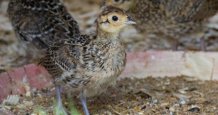Psychology news archive 2020

Big bumblebees learn locations of best flowers
Big bumblebees take time to learn the locations of the best flowers, new research shows.

Squirrels need good neighbours
Living beside familiar neighbours boosts a squirrel's chances of survival and successful breeding, new research shows.

Scientists predict 'optimal' stress levels
Scientists have created an evolutionary model to predict how animals should react in stressful situations.

Call for 'debt driving licence'
People borrowing money for the first time should only be given small amounts until they have proved their competence, a new study says.

Mountain gorillas are good neighbours – up to a point
Mountain gorilla groups are friendly to familiar neighbours – provided they stay out of "core" parts of their territory – new research shows.

Feeling misunderstood boosts support for Brexit
Feeling misunderstood by other groups makes people more likely to support separatist causes like Brexit and Scottish independence, new research suggests.

Old males vital to elephant societies
Old male elephants play a key role in leading all-male groups, new research suggests.

Swans reserve aggression for each other
Swans display more aggression to fellow swans than other birds, new research shows.

Trial tests whether cannabidiol could help treat cannabis use disorder
Prescription medication of cannabis extract cannabidiol (CBD) is safe for daily use in treating cannabis use disorder, and could help people to cut down on cannabis use, according to an initial randomised controlled trial published in The Lancet Psychiatry journal.
_feat_218x115.jpg)
Gorilla relationships limited in large groups
Mountain gorillas that live in oversized groups may have to limit the number of strong social relationships they form, new research suggests.

Educators at museums, zoos and aquariums boost learning
Educators at informal science learning sites such as science museums, zoos and aquariums promote interest and learning among visitors of all ages, new research has found.

Research to reveal the evolutionary reasons why we get by with a little help from our friends
The quest to discover why friendship plays such a pivotal role in social and mental well-being has been given a significant boost, it has been announced.

Concerns over police head injuries
Head injuries may be worryingly common among police officers, according to a new pilot study led by the University of Exeter.

Gender bias kept alive by people who think it’s dead
Workplace gender bias is being kept alive by people who think it’s no longer an issue, new research suggests.

‘Matador’ guppies trick predators
Trinidadian guppies behave like matadors, focusing a predator’s point of attack before dodging away at the last moment, new research shows.

Pinker flamingos more aggressive
Bright pink flamingos are more aggressive than paler rivals when fighting over food, new research shows.

Age, gender and culture ‘predict loneliness’
Young people, men and people in “individualistic” societies report higher levels of loneliness, according to a large-scale global study.

Celebrating Prestigious Athena SWAN Awards
Two prestigious Athena SWAN awards have just been granted to three University of Exeter departments to recognise their commitment to gender equality.

Online treatment to help young people tackle depression, anxiety and worry
An online treatment proven to prevent anxiety and depression in young people is set to become available to the NHS and other mental health services worldwide.

Aphantasia clears the way for a scientific career path
People with low or no visual imagery are more likely to work in scientific and mathematical industries than creative sectors, according to new research.

‘Ethnic spaces’ make minority US students feel at home
“Ethnic spaces” at US universities make students from underrepresented minority groups feel a greater sense of belonging and engagement with their university, new research suggests.

Flamingos form firm friendships
Flamingos form friendships that last for years, new research shows.

Zoo improvements should benefit all animals
Zoo improvements should benefit all animals and include a wide range of “enrichment” techniques, researchers say.

Tougher start could help captive-bred game birds
Tougher early lives could help captive-bred game birds develop survival skills for adulthood in the wild, new research suggests.

Strongly ‘handed’ squirrels less good at learning
Squirrels that strongly favour their left or right side are less good at learning, new research suggests.
